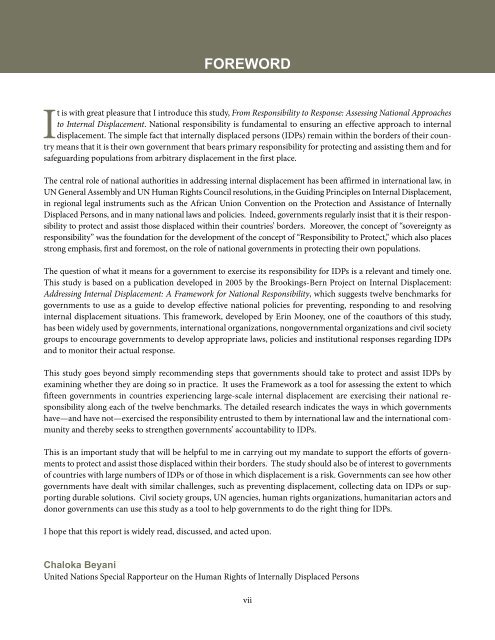From Responsibility to Response: Assessing National - Brookings
From Responsibility to Response: Assessing National - Brookings
From Responsibility to Response: Assessing National - Brookings
Create successful ePaper yourself
Turn your PDF publications into a flip-book with our unique Google optimized e-Paper software.
FOREWORD<br />
It is with great pleasure that I introduce this study, <strong>From</strong> <strong>Responsibility</strong> <strong>to</strong> <strong>Response</strong>: <strong>Assessing</strong> <strong>National</strong> Approaches<br />
<strong>to</strong> Internal Displacement. <strong>National</strong> responsibility is fundamental <strong>to</strong> ensuring an effective approach <strong>to</strong> internal<br />
displacement. The simple fact that internally displaced persons (IDPs) remain within the borders of their country<br />
means that it is their own government that bears primary responsibility for protecting and assisting them and for<br />
safeguarding populations from arbitrary displacement in the first place.<br />
The central role of national authorities in addressing internal displacement has been affirmed in international law, in<br />
UN General Assembly and UN Human Rights Council resolutions, in the Guiding Principles on Internal Displacement,<br />
in regional legal instruments such as the African Union Convention on the Protection and Assistance of Internally<br />
Displaced Persons, and in many national laws and policies. Indeed, governments regularly insist that it is their responsibility<br />
<strong>to</strong> protect and assist those displaced within their countries’ borders. Moreover, the concept of “sovereignty as<br />
responsibility” was the foundation for the development of the concept of “<strong>Responsibility</strong> <strong>to</strong> Protect,” which also places<br />
strong emphasis, first and foremost, on the role of national governments in protecting their own populations.<br />
The question of what it means for a government <strong>to</strong> exercise its responsibility for IDPs is a relevant and timely one.<br />
This study is based on a publication developed in 2005 by the <strong>Brookings</strong>-Bern Project on Internal Displacement:<br />
Addressing Internal Displacement: A Framework for <strong>National</strong> <strong>Responsibility</strong>, which suggests twelve benchmarks for<br />
governments <strong>to</strong> use as a guide <strong>to</strong> develop effective national policies for preventing, responding <strong>to</strong> and resolving<br />
internal displacement situations. This framework, developed by Erin Mooney, one of the coauthors of this study,<br />
has been widely used by governments, international organizations, nongovernmental organizations and civil society<br />
groups <strong>to</strong> encourage governments <strong>to</strong> develop appropriate laws, policies and institutional responses regarding IDPs<br />
and <strong>to</strong> moni<strong>to</strong>r their actual response.<br />
This study goes beyond simply recommending steps that governments should take <strong>to</strong> protect and assist IDPs by<br />
examining whether they are doing so in practice. It uses the Framework as a <strong>to</strong>ol for assessing the extent <strong>to</strong> which<br />
fifteen governments in countries experiencing large-scale internal displacement are exercising their national responsibility<br />
along each of the twelve benchmarks. The detailed research indicates the ways in which governments<br />
have—and have not—exercised the responsibility entrusted <strong>to</strong> them by international law and the international community<br />
and thereby seeks <strong>to</strong> strengthen governments’ accountability <strong>to</strong> IDPs.<br />
This is an important study that will be helpful <strong>to</strong> me in carrying out my mandate <strong>to</strong> support the efforts of governments<br />
<strong>to</strong> protect and assist those displaced within their borders. The study should also be of interest <strong>to</strong> governments<br />
of countries with large numbers of IDPs or of those in which displacement is a risk. Governments can see how other<br />
governments have dealt with similar challenges, such as preventing displacement, collecting data on IDPs or supporting<br />
durable solutions. Civil society groups, UN agencies, human rights organizations, humanitarian ac<strong>to</strong>rs and<br />
donor governments can use this study as a <strong>to</strong>ol <strong>to</strong> help governments <strong>to</strong> do the right thing for IDPs.<br />
I hope that this report is widely read, discussed, and acted upon.<br />
Chaloka Beyani<br />
United Nations Special Rapporteur on the Human Rights of Internally Displaced Persons<br />
vii

















